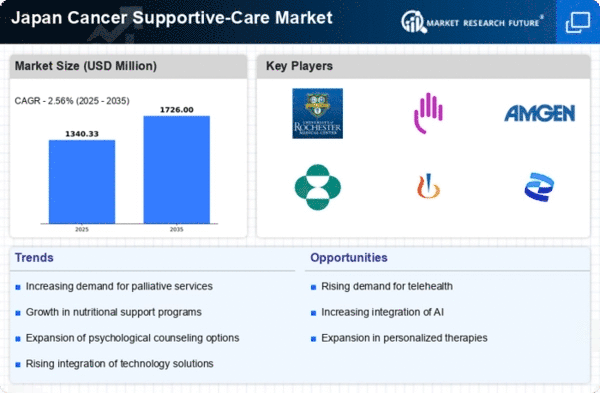Rising Cancer Incidence
The increasing incidence of cancer in Japan is a primary driver for the Cancer Supportive-Care Market. According to the latest statistics, cancer remains the leading cause of death, accounting for approximately 30% of all fatalities. This alarming trend necessitates enhanced supportive care services to improve patient outcomes and quality of life. As the population ages, the demand for comprehensive supportive care solutions is expected to rise. The cancer supportive-care market is projected to grow significantly, with estimates suggesting a compound annual growth rate (CAGR) of around 8% over the next five years. This growth is likely to be fueled by the need for effective pain management, nutritional support, and psychological counseling, all of which are critical components of supportive care.
Patient-Centric Care Models
The shift towards patient-centric care models is reshaping the Cancer Supportive-Care Market in Japan. Healthcare providers are increasingly focusing on personalized care plans that cater to the individual needs of cancer patients. This approach involves collaboration among multidisciplinary teams, including oncologists, nurses, nutritionists, and mental health professionals, to deliver holistic care. Recent studies suggest that patient-centric models can lead to improved treatment adherence and satisfaction rates, with approximately 85% of patients reporting a better overall experience. As the demand for tailored supportive care solutions grows, the cancer supportive-care market is expected to evolve, fostering innovations that prioritize patient preferences and enhance overall care delivery.
Government Initiatives and Funding
Government initiatives aimed at improving cancer care in Japan play a crucial role in driving the Cancer Supportive-Care Market. The Japanese government has implemented various policies to enhance cancer treatment and support services, including increased funding for research and development. In recent years, the budget allocation for cancer-related programs has seen a notable increase, with approximately ¥100 billion earmarked for cancer research and supportive care services. These initiatives not only aim to improve treatment outcomes but also focus on providing holistic care to patients. As a result, the cancer supportive-care market is likely to benefit from enhanced resources and infrastructure, leading to better access to supportive services for patients and their families.
Advancements in Treatment Modalities
The rapid advancements in cancer treatment modalities are significantly influencing the Cancer Supportive-Care Market. Innovative therapies, such as immunotherapy and targeted therapies, have transformed the landscape of cancer treatment, leading to improved survival rates. However, these treatments often come with complex side effects that necessitate comprehensive supportive care. For instance, patients undergoing chemotherapy may experience severe nausea, fatigue, and pain, which require effective management strategies. The cancer supportive-care market is adapting to these changes by offering specialized services that address the unique needs of patients receiving advanced treatments. This adaptation is expected to drive market growth, as healthcare providers increasingly recognize the importance of supportive care in enhancing patient quality of life.
Growing Awareness of Palliative Care
There is a growing awareness of the importance of palliative care in Japan, which is positively impacting the Cancer Supportive-Care Market. Palliative care focuses on providing relief from the symptoms and stress of serious illness, emphasizing quality of life for both patients and their families. Recent surveys indicate that approximately 70% of cancer patients express a desire for palliative care services, highlighting the need for integrated supportive care approaches. This increasing recognition is prompting healthcare providers to incorporate palliative care into standard cancer treatment protocols. Consequently, the cancer supportive-care market is likely to expand as more patients seek comprehensive care that addresses their physical, emotional, and spiritual needs.
















